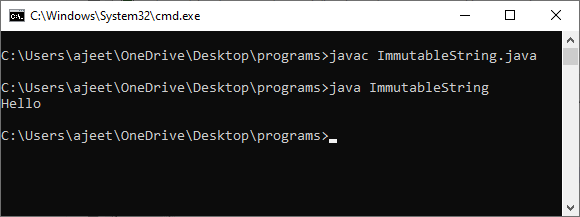Why Are Strings Immutable in Java? Trick Factors and Advantages Described
Wiki Article
What Is Immutable Strings and How It Works
In the realm of programs, understanding the idea of unalterable strings is critical for developing durable and protected applications. Unalterable strings refer to strings that can not be modified after they are created, guaranteeing information integrity and predictability within the code.The Basics of Immutable Strings
Unalterable strings, as a fundamental idea in programming, are character series that can not be changed as soon as they are produced. This suggests that when a string is appointed a value, that value can not be altered. In languages like Python and Java, strings are unalterable things, resulting in numerous ramifications in terms of memory management and data honesty.One of the crucial advantages of immutable strings is that they provide a sense of security in data manipulation. Because the material of an immutable string can not be modified, it guarantees that the original data stays intact, decreasing the risk of unintentional modifications throughout program implementation (Why are strings immutable in Java?). This building additionally simplifies debugging processes, as developers can trust that once a string is defined, its value will certainly not be accidentally altered
When a new string is produced based on an existing one, instead than customizing the original string, the brand-new value is saved independently. In general, comprehending the fundamentals of immutable strings is essential for understanding shows ideas and enhancing code efficiency.
Advantages of Immutable Strings
Building upon the safety and security and efficiency advantages of unalterable strings, their advantages reach improving code integrity and simplifying simultaneous programming jobs. By being immutable, strings can not be customized after creation, which gets rid of the danger of unplanned adjustments in the data they store. This inherent immutability makes sure that once a string is developed, its value continues to be consistent throughout the program's implementation, minimizing the chances of pests created by unforeseen changes.Furthermore, unalterable strings add to code dependability by making it much easier to reason regarding the state of a program. Considering that strings can not be altered, developers can rely on that a string will always hold the exact same worth, streamlining debugging and upkeep initiatives. This predictability brings about much more stable and reputable codebases.

Implementation in Shows Languages
Within various programming languages, the unification of immutable strings is an essential aspect that affects just how information is handled and manipulated within code frameworks. The implementation of unalterable strings differs throughout various programming languages, with each language providing its own devices to support this idea.

In contrast, languages like C and C++ do not have built-in assistance for unalterable strings. Designers in these languages should manually apply immutability by imposing guidelines within their code to stop straight alterations to string objects.
Ideal Practices for Dealing With Immutable Strings
When dealing with unalterable strings in shows Going Here languages like Java and Python, sticking to best methods guarantees safe and secure and effective data manipulation. Among the crucial ideal practices is to make use of StringBuilder or StringBuffer rather of straight manipulating strings, particularly when managing comprehensive concatenation operations. These courses give mutable choices for string manipulation, aiding to avoid unnecessary memory appropriations and enhancing performance.Furthermore, when functioning with delicate information such as passwords or API secrets, it is vital to stay clear of storing them as ordinary text in immutable strings. Utilizing protected storage mechanisms like char varieties or specialized collections for managing delicate information helps mitigate safety and security threats associated with unalterable strings.
Real-world Applications and Instances
Exploring functional executions of unalterable strings in different markets discloses their significant effect on information integrity and system dependability. In the healthcare sector, unalterable strings play a critical role in guaranteeing the safety and security and discretion of individual information. By stopping unauthorized modifications to delicate details such as clinical documents and prescriptions, immutable strings help keep compliance with rigorous privacy laws like HIPAA.Banks likewise gain from the unalterable nature of strings to enhance the safety of customer data and purchase documents. Immutable strings aid stop fraud and unapproved changes to monetary information, supplying a robust defense versus cyber threats and guaranteeing the trust fund and confidence of customers.

Conclusion
To conclude, immutable strings are fixed and stable series of characters that provide benefits such as string safety and improved performance in programming. They are implemented in various programming languages to guarantee data integrity and security. Best practices for collaborating with unalterable strings consist of preventing straight alterations and making use of approaches look at these guys that return brand-new string things. Real-world applications of unalterable strings consist of information file encryption, caching, and string adjustment tasks.Immutable strings refer to strings that can not be altered after they are created, making sure data integrity and predictability within the code. When a new string is produced based on an existing one, instead than modifying the original string, the brand-new worth is kept independently.In languages like Java and Python, strings are unalterable by default, indicating that when a string object is developed, its value can not be transformed - Why are strings immutable in Java?. Best methods for functioning with immutable strings include staying clear of straight adjustments and making use of approaches that return brand-new string items. Real-world applications of unalterable strings consist of information encryption, caching, and string control jobs
Report this wiki page